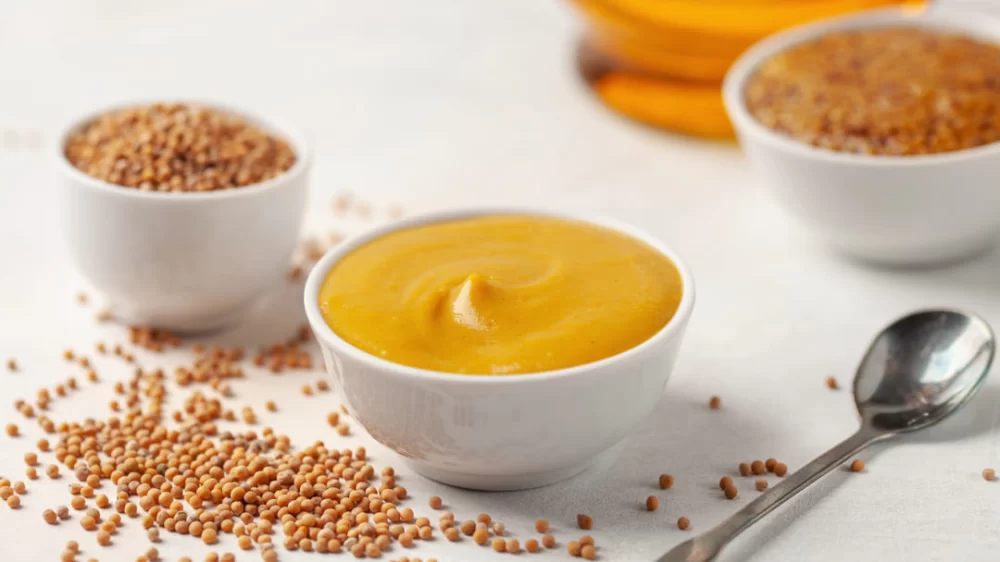Can Dogs Eat Honey Mustard Sauce? The Truth You Need to Know
If you're like me, sometimes you just can't resist dipping a chicken nugget or crispy fries into a tangy honey mustard sauce. The sweet and savory combo is a favorite in many households, and every once in a while, your dog might be eyeing that sauce too. But before you give in to those puppy-dog eyes, it’s important to ask: Can dogs eat honey mustard sauce? Is it safe for them? In this article, I'll break down the facts about honey mustard and whether it's a good idea to share it with your furry friend.
What’s in Honey Mustard Sauce?
Honey mustard sauce is a delicious blend of honey, mustard, and various seasonings. While these ingredients can create a flavorful treat for humans, they’re not necessarily ideal for dogs. In fact, when I first wondered about giving my dog a little taste of my honey mustard, I didn’t realize just how many ingredients could potentially harm him. Here are the main components in honey mustard sauce:
- Honey: Honey is generally safe for dogs in small amounts, providing some natural sweetness and energy.
- Mustard: Mustard contains compounds like mustard seeds and turmeric, which can irritate a dog’s digestive system and may even cause an upset stomach.
- Vinegar: Vinegar, often used in mustard sauce, can cause gastrointestinal upset in dogs, especially if consumed in excess.
- Salt: Excessive salt in any food is harmful to dogs and can lead to dehydration or sodium ion poisoning.
- Other seasonings: Additional spices or artificial additives may be present, which could cause allergic reactions or digestive issues in some dogs.
Why Honey Mustard Isn’t Safe for Dogs
While honey mustard might seem like a harmless treat, it actually contains ingredients that can upset your dog’s stomach or worse. I made the mistake of letting my dog have a small lick of my honey mustard once, thinking it wouldn’t be a big deal. Soon after, he seemed a bit lethargic, and his stomach was off. That’s when I learned that honey mustard, with all of its spices and sweeteners, can be harmful to dogs. Here’s why:
- Mustard Seeds: Mustard contains compounds like sinigrin, which can irritate a dog’s gastrointestinal system. While small amounts may not cause major issues, larger amounts can lead to nausea, vomiting, and diarrhea.
- Excess Sugar and Honey: The high sugar content in honey mustard is not ideal for dogs. Too much sugar can lead to obesity, diabetes, and other health problems, especially for dogs with a tendency to gain weight easily.
- Spices and Vinegar: Strong spices and vinegar can cause digestive discomfort, especially for dogs with sensitive stomachs. Ingesting these ingredients could lead to acid reflux, heartburn, or other digestive problems.
- Salt: Salt is a major concern because excessive consumption can lead to dehydration, kidney damage, or even sodium poisoning in extreme cases. Dogs are much more sensitive to salt than humans, so it's important to be cautious about any foods with added salt.
What Happens If My Dog Eats Honey Mustard?
If your dog has already eaten honey mustard sauce, don't panic, but keep a close eye on them. Depending on how much they consumed and their size, symptoms may vary. Some dogs might only experience mild gastrointestinal discomfort, while others could face more severe reactions. Here's what you might see:
- Upset Stomach: The most common reaction to honey mustard is nausea, vomiting, or diarrhea. These symptoms should clear up within a few hours, but keep an eye on your dog and ensure they stay hydrated.
- Increased Thirst: If your dog ate too much honey mustard with salt, they may become excessively thirsty. Make sure they have access to fresh water at all times.
- Lethargy: If your dog is feeling unwell after eating honey mustard, they may become tired or less active than usual. Rest is usually the best remedy.
- More Serious Symptoms: If your dog consumed a large amount of honey mustard sauce, you may notice more severe symptoms like tremors, disorientation, or seizures. This would require immediate veterinary attention.
What Should You Do If Your Dog Eats Honey Mustard Sauce?
If your dog gets a taste of honey mustard, the first thing to do is assess the situation. If they only had a small lick, they’re likely going to be okay. However, it’s always a good idea to watch for any changes in their behavior or signs of discomfort. Here’s what I did when I realized my dog had snuck some honey mustard:
- Monitor your dog closely for any signs of digestive distress, such as vomiting or diarrhea.
- Ensure they have access to plenty of fresh water to stay hydrated.
- If you notice any concerning symptoms or your dog appears lethargic, contact your vet for advice.
- If your dog eats a large amount, or if they show severe symptoms, take them to the vet immediately for treatment.
Can Dogs Have Mustard in Other Forms?
Now that we know honey mustard isn’t safe for dogs, you might be wondering about regular mustard. In small amounts, plain mustard (without added sugars or spices) isn’t necessarily toxic to dogs. However, it still poses some risks due to its acidic content and the mustard seeds. If you’re considering giving your dog mustard as an occasional treat, it’s best to avoid it altogether or limit the quantity. Always keep in mind that dogs should have a diet that’s as natural and free from artificial additives as possible.
Alternatives to Honey Mustard for Dogs
If you’re looking for ways to treat your dog, there are plenty of dog-safe options available. When I want to spoil my dog, I opt for healthy, pet-friendly alternatives. Here are a few ideas:
- Plain Yogurt: A small amount of plain, unsweetened yogurt can be a tasty treat for your dog.
- Carrot Sticks: Carrots are a great low-calorie snack for dogs, and they’re full of vitamins and fiber.
- Peanut Butter: Natural, unsweetened peanut butter (in moderation) is another dog favorite, as long as it doesn’t contain xylitol, which is toxic to dogs.
- Frozen Blueberries: These are a great way to cool off your dog in the summer, and they’re packed with antioxidants.
Ultimately, the best way to keep your dog happy and healthy is to stick to pet-safe treats that are specifically designed for their dietary needs. If you're ever unsure about whether a food item is safe for your dog, it's always a good idea to consult with your veterinarian.












